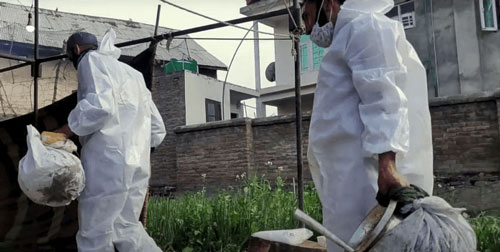Shefali Rafiq
The deserted streets in Srinagar,currently under a lockdown to curb the spread of Covid-19, brings back the memories of the August 2019 clampdown for Junaid Firdous Naqash, a 32-year-old tent supplier.
Naqash, a third generation businessman in his family, said that the peak marriage season — between June and September — was like a festival for them.
“The business collapsed when Article 370 was [amended] but the pandemic crushed it further,” he said.
After three years of a near-constant lockdown in Kashmir, the Valley’s big-fat weddings are now diminishing, pushing thousands of families associated with the business to the walls.
From wedding dresses, jewelry, to throwing up a large-scale cuisine party, the weddings run a handful of all-size businesses alongside.
In Kashmiri weddings, a social phenomenon as well as an economic activity, said Javaid Khan, a professor at the Economics department in University of Kashmir, people either spend the money out of savings — or even borrow.
The back-to-back lockdowns — beginning in 2019 when New Delhi clamped curfews in August, seven months before the pandemic hit — however, have now disrupted one of the significant economic cycles.
From an average wedding expenditure of five lakh rupees, Khan said, it has come down to 1-2 lakh rupees.
“Any shock to the business is going to impact all the possible spheres of the economy,” he added.
With the sector going down, the people associated with the industry, including tents’ suppliers, catering and raw material providers, have suffered huge losses as their perpetual wait for normalcy stays uncertain.
Almost in all the Kashmiri weddings, the function begins with the pitching of a tent – a large multi-color cloth and bamboo made fancy outhouse, the size of which depends upon the number of guests on board.
Prior to the pandemic, Naqash would generally get three orders in a day; six was a day spent better.
While the prices are spread over a range, a single order at times could earn him up to three lac rupees.
A decline also led to the firing of his staff of five — whom he now seldom employs on a daily-wage basis upon business enquiries. “We feed our families by His grace, otherwise we have no source of income,” he lamented.
Kashmiris are known for their love for mutton; estimates quantify annual consumption at an unbelievable 50,000 tonnes and the Kashmiri weddings are almost incomplete without it.
Mehraj-ud-din Ganai, the general secretary of the All Kashmir Wholesale Mutton Dealers Association, said that almost 80 percent of the weddings have been postponed — the remaining have taken place in a simple way.
On any other day, the customers would ask for four to five quintals of meat, however, as the coronavirus spread further in Kashmir, the orders were reduced to fifty to sixty kilograms of meat. Meanwhile, the import of livestock dropped too, added Ganai.
Unlike the gathering of a thousand people, the administration in J-K restricted the number of guests at weddings to 25, depending on the spread of Covid-19 in the area.
“Our orders got affected upto 90 percent,” said Ganai.
Due to the lockdown, lakhs of jobs have been lost in Kashmir. Attaullah Khan, a traditional cook from Hyderpora area of Srinagar, fired fifteen people, who worked under him.
Now, his core group of five chefs try to meet the demand. Instead of serving a feast, Kashmiri wazwan, comprising seven to twelve courses, served on big copper plates, traditionally, Attaullah now prepares a low-key feast for not more than sixty people.
“Now we don’t have any work, so why would we need more men?” he said.
—Courtesy The Kashmir Wala.










